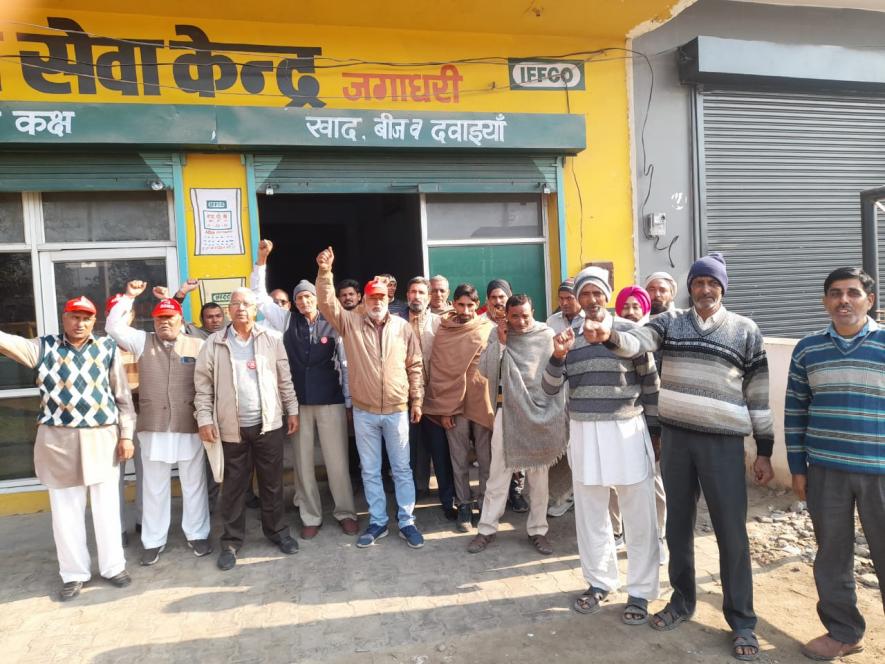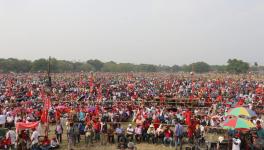Haryana: Urea Shortage Persists, Farmers Fear Crop Losses

Mangat Ram visits his 12-acre farm to take stock of crops every morning. With favourable climatic conditions, he has been expecting normal production of wheat this season. However, missing stacks of urea, a fertiliser essential for crops, from stores is making him nervous. After running from one store to other, he could only arrange 10 stacks of urea against the need for 36 stacks. Ram’s tale resembles the tragedy of a large number of farmers in Haryana who are queuing in long lines to get hold of this essential soil nutrient. Reports of a tussle between farmers and local administrations in Bhiwani, Kaithal and Yamunanagar are abuzz in local newspapers with farmers even gheraoing state agriculture minister JP Dalal in Behal Bhiwani the previous month in his own constituency.
Talking to NewsClick, Ram said that fertiliser is applied in farms after the first spell of rains to boost the growth of plants. “With this much supply, the crop would be affected. When I approached local agents for urea, they asked us to buy extra chemicals which are of no use to farmers. We simply denied buying the extra chemicals. The fertiliser companies are in connivance with local agents and taking advantage of the grim situation.”
Echoing similar sentiments, Jarnail Singh Sangwan, a farmer from Jagadhari in Yamuna Nagar district said that the farmers are feeling the heat of scarcity as they were not prepared for the situation and non-availability of any substitute for the fertiliser. Sangwan and his team have been locking horns with district administration since December 17 when they staged a massive protest at the DC office. He said, “In Yamuna Nagar district, we were apprised about a slew of factors behind the grim situation. The district administration told us that the allocation of fertilisers is administered centrally through the ministry of chemicals and fertilisers. The Centre has released more stock to election-bound states to quell any discontent. Second, the transportation of subsidised urea is managed through railways and there are several points where the stacks are taken off from the trains. The point, in our case, is Karnal district, which takes a larger share of stock and distributes remaining stock in other districts locally through trucks.”
Sangwan went on to suggest that the crisis is further fueled by illegal sales of subsidised fertilisers to factories making plywood as it is used as a raw material in processing the ply boards. He said, “with these odds, the farmers are looking up to skies for rains and timely relief.”
Reports suggest that the reason behind the scarcity of the much-sought fertiliser and raw material globally has been the release of less stock by the biggest producers like China and Russia. However, the farmers’ bodies suggest that the government officials knew about the crisis and did not act proactively to avert the situation.
Balbir Thakan from All India Kisan Sabha who is leading the front with farmers for their share of urea in Bhiwani said that the government is achieving two goals with a delayed and rather deliberate shortage of urea. Talking to NewsClick over the phone, Thakan said, “It would be childish to say that the scarcity has global roots. Everybody knows about it but the question remains important what did the government do to avert the situation? Any country would prefer its interest first and the producers did exactly this. What is at play is more sinister to push farmers to private players by deliberately creating artificial shortages. We are noticing that the seeds and pesticides sector are already handled by big private players including Monsanto and Syngenta. The government wants to withdraw its hands from the fertiliser sector by eliminating subsidies too. A larger share of the market by private players ensure that farmers remain chained to these companies.”
Further, Thakan added that “The government repealed three contentious farm laws the previous year under immense pressure and discontent. Now, it is taking an indirect route to achieve purposes. With less production, the government will have to procure less through the food corporation of India for the central pool. The farmers will also be compelled to sell their produce at throwaway prices.”
Get the latest reports & analysis with people's perspective on Protests, movements & deep analytical videos, discussions of the current affairs in your Telegram app. Subscribe to NewsClick's Telegram channel & get Real-Time updates on stories, as they get published on our website.























